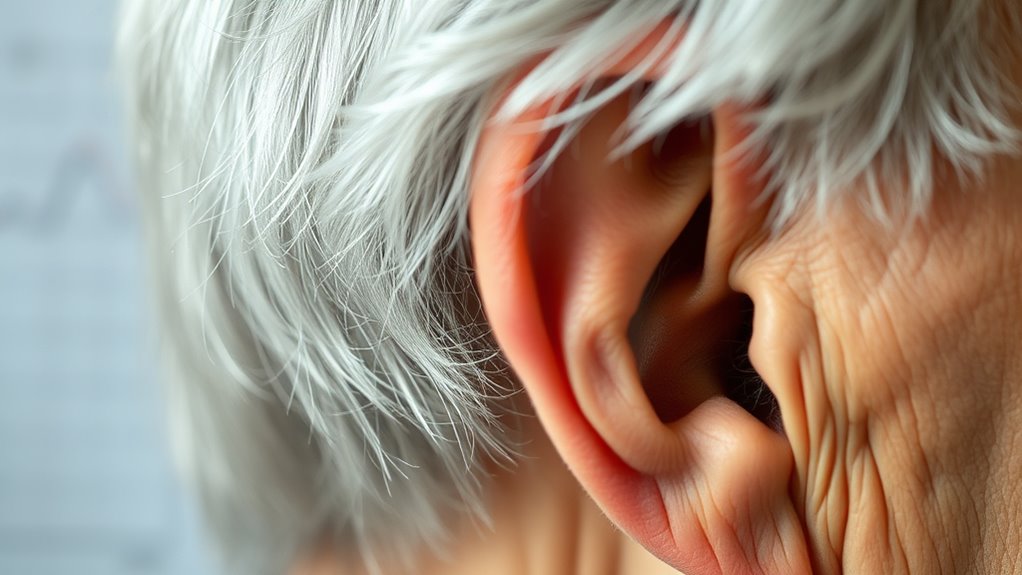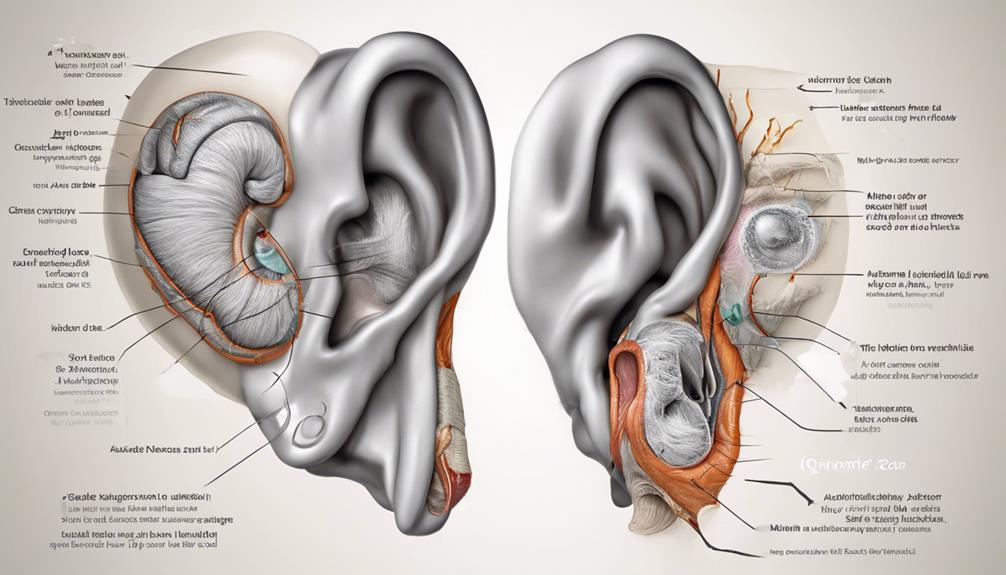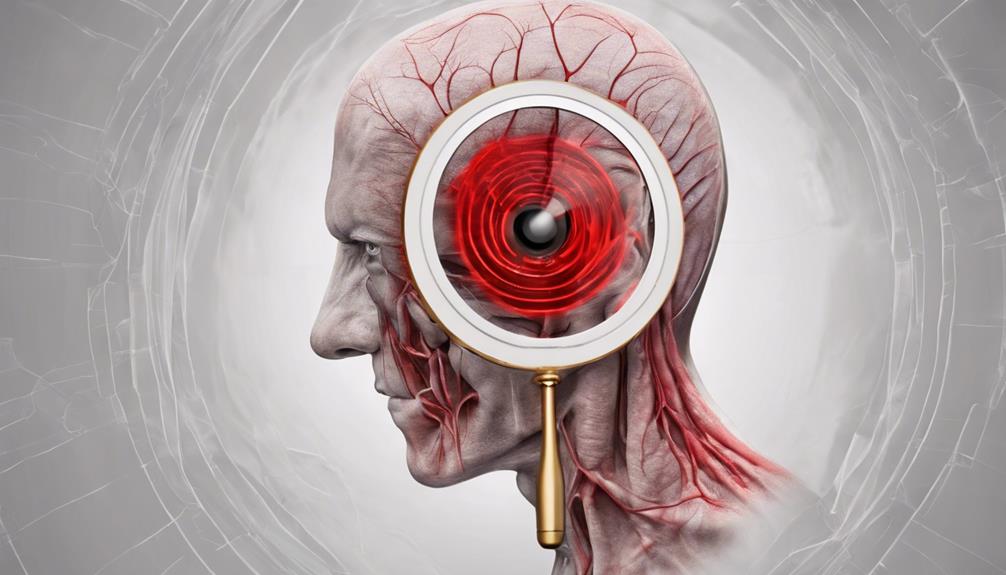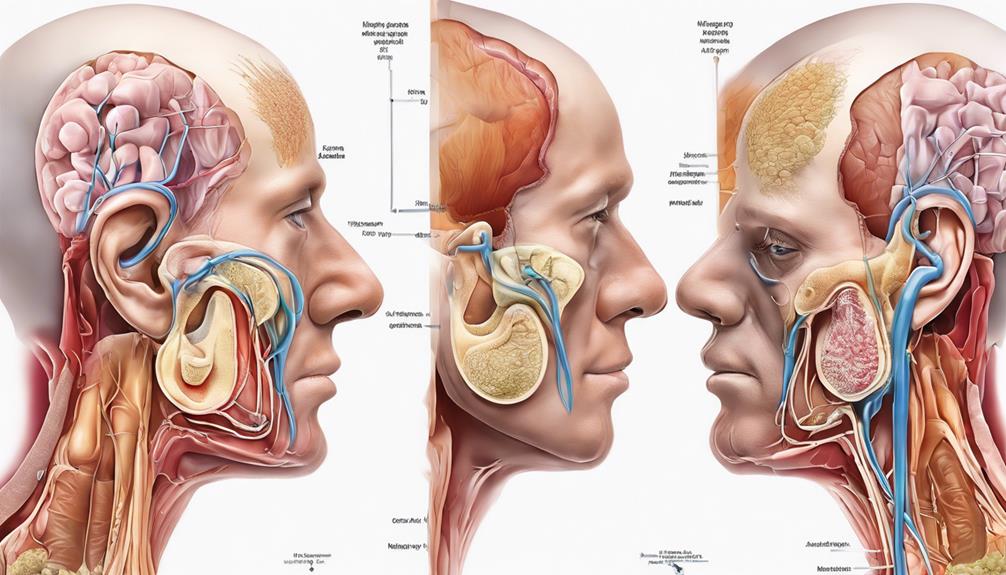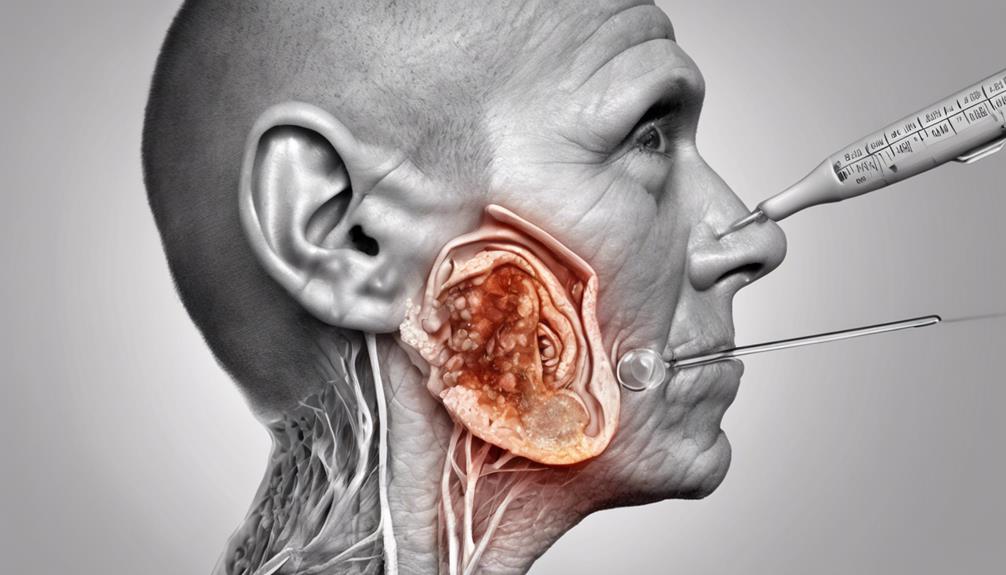Research shows that age-related hearing decline results from biological changes like inner ear deterioration and nerve loss, influenced by genetics and environmental factors such as noise and pollution. Advances in diagnostic tools help detect hearing issues earlier, and new treatments like smarter hearing aids and cochlear implants offer better support. Taking steps like protecting your ears and maintaining a healthy lifestyle can help preserve your hearing longer. Continue exploring to discover how new technologies and strategies can benefit you.
Key Takeaways
- Age-related hearing decline involves deterioration of cochlear structures and loss of auditory neurons.
- Genetic predispositions and environmental exposures, like noise and pollution, influence the severity of presbycusis.
- Advances in diagnostics, including machine learning, enable earlier and more accurate detection of hearing loss.
- Emerging technologies, such as smarter hearing aids and cochlear implants, improve sound clarity and user experience.
- Preventive strategies, including dietary support and noise protection, can help maintain hearing health with age.

Audien Atom One OTC Hearing Aids – Wireless, Rechargeable, and Comfortable | Clear Sound in a Small, Discreet Design for Seniors & Adults with Hearing Loss
Hear What Matters Most: Hearing isn’t one-size-fits-all. That’s why our adjustable frequency system lets you personalize your sound…
As an affiliate, we earn on qualifying purchases.
As an affiliate, we earn on qualifying purchases.
The Biological Processes Behind Hearing Loss With Age

As you age, the structures in your inner ear undergo significant changes that contribute to hearing loss. The inner ear’s delicate components, including the cochlea, gradually deteriorate over time. Within the cochlea, the auditory neurons, which transmit sound signals to your brain, start to decline in number and function. This degeneration reduces your ability to interpret sounds accurately, especially high-frequency tones. Additionally, the inner ear’s hair cells, responsible for converting sound vibrations into electrical signals, become damaged or die off as you age. These biological changes weaken the communication pathway between your ear and brain, leading to difficulty hearing and understanding speech. Recognizing that these changes are part of the biological processes behind hearing decline can help in seeking early interventions and protective strategies. Understanding this process highlights how aging directly impacts the inner ear’s essential structures and auditory neuron health.

Becoming Hearing Empowered: A Guided Journal for the Deaf and Hard of Hearing
As an affiliate, we earn on qualifying purchases.
As an affiliate, we earn on qualifying purchases.
Genetic and Environmental Factors Influencing Presbycusis

Genetic and environmental factors substantially influence the likelihood and severity of age-related hearing loss, or presbycusis. Your genetic predispositions can determine how vulnerable you are to hearing decline as you age, affecting nerve health and inner ear structures. Environmental exposures also play a significant role; prolonged loud noise, pollution, and ototoxic medications can accelerate damage to your auditory system. If you have a family history of hearing loss, you’re at a higher risk, but minimizing harmful exposures can help delay onset. Lifestyle choices matter too—smoking and poor nutrition can worsen hearing decline. While genetics set the foundation, your environment and habits shape how quickly presbycusis develops, making awareness and proactive steps vital in managing age-related hearing health. Additionally, understanding the role of sound exposure in hearing health can aid in developing preventive strategies.

bylikeho Automotive Stethoscope,Car Accessories Engine Block Diagnostic Automotive Hearing Tool with Extended Probe,Car Stethoscope,Fit for Diagnosing Valve Train,Gears and Other Engine Problems
[High Quality Materials]The engine stethoscope is made of high-quality stainless steel material, which is highly reliable, corrosion-resistant, wear-resistant,…
As an affiliate, we earn on qualifying purchases.
As an affiliate, we earn on qualifying purchases.
Advances in Diagnostic Techniques and Early Detection
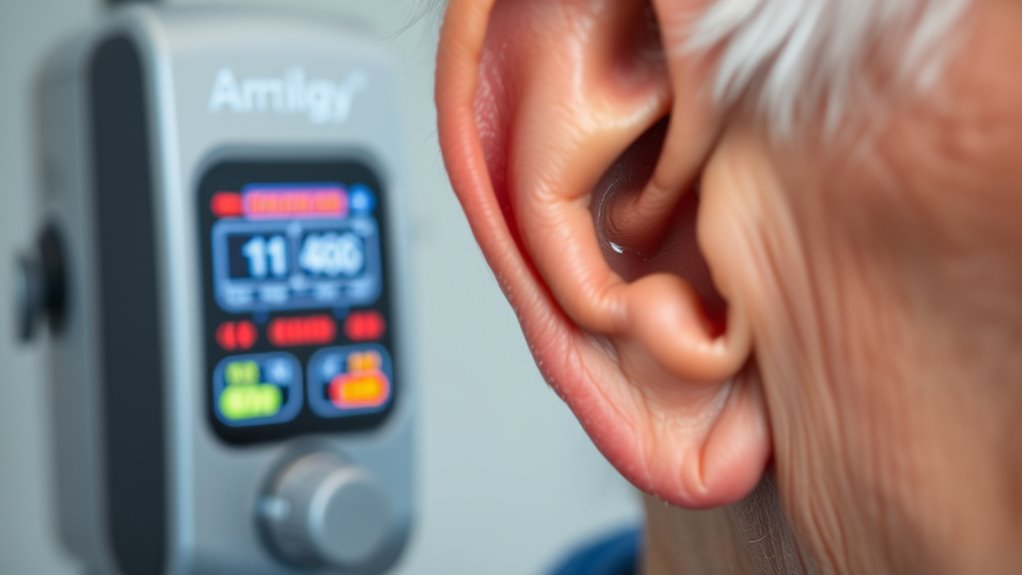
Recent advances in diagnostic techniques have revolutionized how you identify and monitor age-related hearing decline. Machine learning algorithms now analyze audiometric testing data more accurately, detecting subtle early signs often missed by traditional methods. These innovations enable earlier intervention, improving outcomes and quality of life. Here’s a quick comparison:
| Traditional Methods | Modern Techniques |
|---|---|
| Manual audiogram | Automated, machine learning-driven analysis |
| Subjective hearing tests | Objective, data-driven insights |
| Broad screening | Precise, individualized diagnosis |
| Delayed detection | Early detection through advanced tech |
Increased accuracy in detection methods helps catch hearing loss sooner, leading to more effective treatment options.

Peltor Sport Tri-Flange Corded Reusable Earplugs, 3 Pair, Noise Reduction Rating (NRR) 26 dB, Comfortable Fit, Ideal For Range, Shooting & Hunting, Washable and Corded, Neon Yellow (97317-10C)
26 dB Noise Reduction Rating (NRR)
As an affiliate, we earn on qualifying purchases.
As an affiliate, we earn on qualifying purchases.
Emerging Treatments and Assistive Technologies
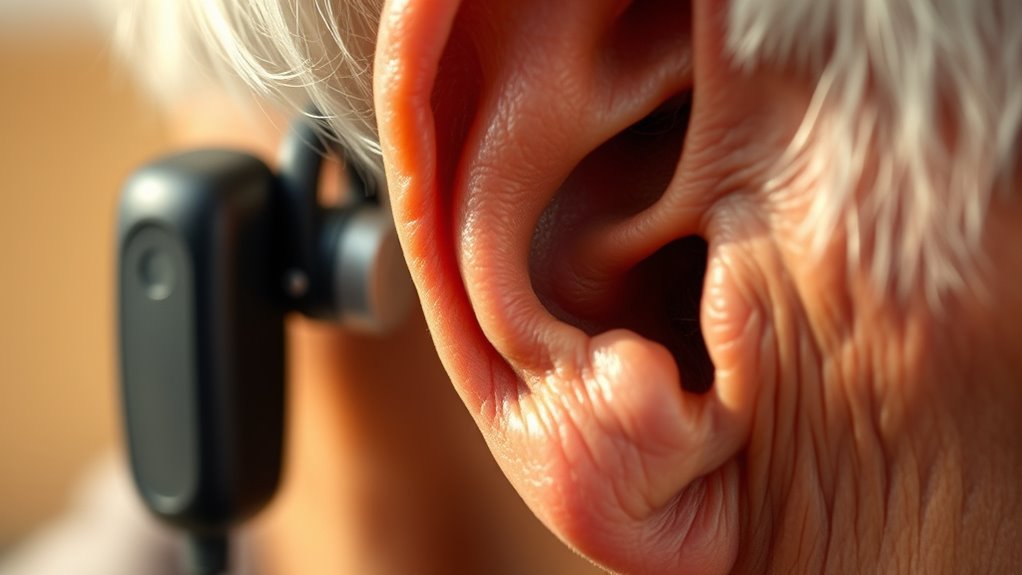
Have you noticed how emerging treatments and assistive technologies are transforming the way we address age-related hearing decline? Recent hearing aid advancements now offer smarter, more personalized sound processing, making it easier to hear in noisy environments. Cochlear implant innovations have also improved markedly, providing clearer sound quality and wider candidacy options for older adults. These advancements help restore communication and reduce social isolation, boosting your quality of life. Furthermore, new device features, like AI-driven noise reduction and wireless connectivity, make managing hearing loss more seamless. As technology continues to evolve, you’ll find these tools become more intuitive and effective, allowing you to stay engaged and connected. Understanding the importance of air quality and proper device maintenance can enhance the effectiveness of these assistive technologies. These emerging treatments are changing the landscape of hearing health and offering new hope for those affected.
Strategies for Prevention and Maintaining Hearing Health

Maintaining your hearing health requires proactive strategies that can help prevent decline and preserve your ability to hear clearly over time. Engaging in music therapy can boost your auditory skills and promote brain health, offering a fun way to stimulate your hearing. Additionally, dietary interventions—such as increasing intake of antioxidants, omega-3 fatty acids, and vitamins—may protect your inner ear cells from damage caused by aging and noise exposure. Protecting your ears from loud sounds by wearing ear protection is also vital. Regular check-ups can catch early signs of decline, allowing for timely intervention. Incorporating advanced technology like digital hearing aids and auditory training programs can further support your hearing health. Combining these approaches creates a thorough plan to support your hearing health, helping you enjoy clearer sound and maintain communication as you age.
Frequently Asked Questions
How Does Age-Related Hearing Loss Vary Across Different Ethnic Groups?
You might notice that age-related hearing loss varies across different ethnic groups due to ethnic disparities and genetic factors. Some groups experience higher or lower risks, influenced by genetics, cultural practices, and exposure to noise. These differences highlight the importance of tailored screening and prevention strategies. By understanding these disparities, you can better address hearing health needs within diverse populations, ensuring everyone gets appropriate care and support.
Can Lifestyle Changes Reverse Existing Age-Related Hearing Decline?
While lifestyle changes can’t fully reverse age-related hearing decline, they can help slow its progression. You should consider incorporating dietary interventions rich in antioxidants and omega-3s, which support ear health. Regular exercise routines boost circulation, improving cochlear blood flow. Staying away from loud noises and managing health conditions like diabetes also help preserve your hearing. These proactive steps can make a meaningful difference in maintaining your hearing over time.
What Are the Psychological Effects of Untreated Hearing Loss in Seniors?
When you leave hearing loss untreated, you might notice a decline in emotional well-being, feeling more anxious or depressed over time. It can also lead to social isolation, making it harder to connect with friends and family. These psychological effects can worsen your overall quality of life, emphasizing the importance of addressing hearing issues early to maintain your mental health and social engagement.
How Does Hearing Loss Impact Cognitive Decline and Dementia Risk?
Did you know that untreated hearing loss can increase your risk of cognitive impairment and dementia by up to 50%? When you don’t address hearing issues, your brain works harder to interpret sounds, which can tire it out and lead to cognitive decline. Over time, this increased strain raises your dementia risk. Taking steps to manage hearing loss helps protect your mental sharpness and overall brain health.
Are There Specific Occupational Exposures That Accelerate Age-Related Hearing Deterioration?
You should be aware that occupational exposures like industrial noise and chemical exposure can speed up hearing deterioration. Continuous exposure to loud noise damages your inner ear’s hair cells, while certain chemicals may harm auditory functions. To protect your hearing, wear proper ear protection and minimize exposure to harmful substances. Taking these precautions can help slow decline and preserve your hearing health as you age.
Conclusion
Remember, an ounce of prevention is worth a pound of cure. By staying aware of the biological, genetic, and environmental factors affecting your hearing, and embracing new diagnostic tools and technologies, you can take control of your hearing health. Start early with simple prevention strategies, and don’t wait until it’s too late. Protecting your hearing now guarantees you enjoy meaningful sounds and conversations for years to come—because hearing loss isn’t inevitable if you act today.

